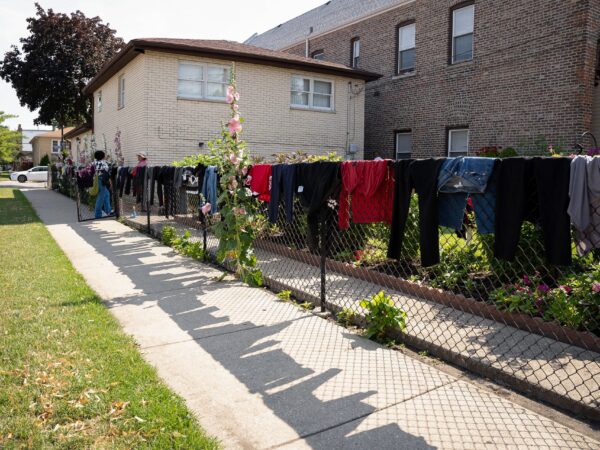
While President Joe Biden’s infrastructure plan, officially the American Jobs Plan, emanates from the White House, a veteran Chicago policy executive says we should consider its genesis as broader than top down.
“It is something that cities and regions have requested – full partnership with the federal government – for quite some time,” said MarySue Barrett, president of the non-profit Metropolitan Planning Council.
Barrett is also encouraged that the Biden plan incorporates more than the traditional roads and bridges definition of infrastructure, which she sees as a starting point. She sees the expanded definition as “investments in the building blocks of what makes places attractive to invest, live and put down roots in.”
Barrett was referring to items in the plan like retrofitting homes and schools for energy efficiency and providing for the care economy – essential home care workers who tend to be women of color, according to a White House fact sheet.
Barrett recently announced that, after 25 years as head of the Metropolitan Planning Council, she is transitioning out and will formally step down when her successor is named.
Great Lakes Now recently spoke with Barrett about the Biden plan covering what some see as a unilateral redefining of infrastructure, the risk that at $2 trillion it could be bogged down in bureaucracy and the reality that it has to survive in a highly partisan political climate.
No redefinition
Barrett does not see infrastructure as “one bit partisan” and does not accept that the plan redefines infrastructure. Instead, she challenges those who do to detail what they would leave out.
“What piece of a well-functioning community or economic sector would you subtract? Do you not need clean water and housing for your workers? And transit choices for people to have ways to get around? Every community can recognize these as building blocks,” Barrett said.
On the ability of governments to effectively deliver on major investments, Barrett said it is a “legitimate concern.”
It is also a concern recently expressed by D.C. watcher and Washington Post columnist Fareed Zakaria who said “building infrastructure is insanely expensive.”
“American exceptionalism has led to an exceptional, uniquely bad system for building infrastructure,” Zakaria wrote, comparing how the U.S. performs on infrastructure projects to European countries.
An example of the difficulty of delivering on big infrastructure projects playing out now is reconstruction of Chicago’s Jane Byrne interchange, a confluence of highways that locals call the spaghetti bowl. Work began in 2013 and was projected to be complete in 2018. The most recent estimate of completion is late 2022 with costs 50% higher than original estimates. It is a joint federal and state project.
Not speaking specifically to the Chicago interchange project, Barrett said problems with big projects “speaks to capacity that’s been whittled away at the federal level and at many state levels, including Illinois and other parts of the Great Lakes region.’’
Barrett said transparency and spending wisely are keys to maintaining the public’s confidence in the plan.
She acknowledged the reality of Washington’s hyper-partisanship and the recent trend for a new administration from an opposing party to undo the work of its predecessor.
But she reiterated that “infrastructure ought to be one area where we don’t retreat into partisan battle lines.” Investing in water systems that remove lead pipes for delivery of water into homes in Michigan and other cities in the Great Lakes region is not partisan, Barrett said.
Barrett believes there should be agreement to improve assets that make communities healthy.
“That’s not a boomerang reaction to the prior administration. It’s filling what’s been a void of an area of action that the federal government can’t continue to abdicate,” according to Barrett.
One issue that did not make the Biden plan that Barrett is passionate about is an end to water shutoffs for those who cannot afford to pay.
Michigan and some other states have mandated an end to shutoffs during the COVID-19 pandemic, but advocates were hoping that the Biden administration would make them permanent. Michigan Reps. Debbie Dingell and Rashida Tlaib, both Democrats, have made the case for an end to shutoffs to the Biden team but the team has yet to act, the Detroit News reported.
Tlaib said the administration listened to the case for an end to shutoffs which did not happen with the Trump administration.
The issue of water shutoffs is about equity and that of a basic human right, according to Barrett who said “we will continue to raise our voices” on it.
The Planning Council calls for Biden to end water shutoffs until 12 months after the COVID-19 crisis ends and for passage of legislation directing $1.5 billion to water bill assistance.
The Biden plan makes only a minor reference of the Great Lakes in the context of “protection and restoration of major land and water resources like Florida’s Everglades and the Great Lakes.”
Since 2010, the Great Lakes have been the recipient of $3.5 billion for restoration projects, with additional funding authorized. On infrastructure, the Great Lakes Commission estimates there is a backlog of $271 billion in repairs for water-related infrastructure in the region.
Biden’s plan is a proposal, a blueprint of the administration’s priorities. The next step is the legislative process, which could be completed this summer at the earliest.
Going forward, Barrett urged policy professionals to avoid focusing on single solutions to complex problems and to make sure different voices are heard. President Biden’s infrastructure plan, Barrett said, “is urgently needed to ensure that this recovery is equitable, just and sustainable.”
Featured image: MarySue Barrett, president of the Metropolitan Planning Council (Photo credit: Gretchen Baria via Metropolitan Planning Council)




